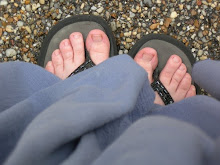an excerpt from Jesus for President...
The Sabbath laws were sor of like God's system of checks and balances on Israel's economy to make sure that no one got too rich and no one got too poor. God knew the painful reality of human sin all too well and the probability that the Hebrew people might drift back into a society of haves and have-nots. To prevent this distorted economy from developing, God got creative and came up with these Sabbath laws.
We catch a glimpse of these laws in those books of the Bible that most of us hardly ever read. Growing up, we were taught to sing the exciting songs of Noah and Abraham and little David and Goliath. But never were we taught songs about debt cancellation, land reforms, food redistribution, and slave amnesty. We don't know if it was just hard to come up with words that rhyme with "debt cancellation" or if folks were hesitant about venturing into the ancient (and sometimes boring) world of Exodus, Leviticus, and Deuteronomy (in which case, we wouldn't blame them). Whatever the case, those books are where some of God's most creative and exciting ideas come alive.
There were laws for welcoming strangers and illegal immigrants and for practices like gleaning, which allowed the poor to take leftovers from the fields. (God would have some harsh things to say about laws prohibiting dumpster diving for food.) The Sabbath laws made sure that the most vulnerable of society (usually widows, orphans, and the elderly) were looked after. And there were clear warnings against taking financial interest or creating debt. (So you can see where we're headed. If we applied Sabbath law today, the bank owner would be as much of a criminal as the bank robber. And a lot of credit card companies and international organizations would be in really big trouble.)
One of the most exciting of the Sabbath laws was applied every seven years. Just like the Hebrew people were supposed to refrain from working every seventh day so that their land, animals, and servants could rest (a marked contrast to their overworked life in Egypt), every seventh year, the Hebrew people had a celebration called the Jubilee (named after the jovel, a ram's horn that sounded to herald the remission), during which they would take the whole year off from work. During this one-year break, all the food that continued to grow in their fields was free for the taking for families who were struggling to get by (Exod. 23:10). And any debt that folks had incurred during the past six years was erased. These laws ensured that those in society who were intent on getting ahead had to take a break so that the gap between the rich and the poor would be kept to a minimum. It is almost impossible for us to grasp how wildly countercultural (and difficult) this economic practice really was. God's idea for this peculiar people was that there be "no poor people among you" (Deut. 15:4), which was a very different way of life for these former slaves.
As as if that weren't enough to keep society from going off-kilter, God threw in one more practice - one giant celebration to be celebrated every 49th/50th year (seven times seven). It was called the Jubilee of Jubilee - God's comprehensive unilateral restructuring of the community's assets to remind Israel that all property and land belonged to God, and that they must never return to a system of slavery (Lev. 25:42). The Jubilee of Jubilee aimed to dismantle structures of social-economic inequality by releasing each community member from debt (Lev. 25:35-42), returning encumbered or forfeited land to its original owners (25:13, 25-28), and freeing slaves (25:47-55). Some might call it a regularly scheduled revolution.
God had seen how these people had suffered under empire in Egypt and had hoped that these initiatives would prevent that from happening ever again.
For the sake of a watching world, God systematically interuppted the human systems that created poverty - releasing debt, setting slaves free, prohibiting usury, and redistributing property. Sounds like a pretty good kingdom, especially compared with the one from which they came and all the surrounding Canaanite powers. Sounds like a platform even we could vote for.
Some folks say dismissively that the Israelites never fully lived out the Jubilee. But folks could also say that Christians don't live out the teachings of Jesus. These are still God's commands and dreams for the world. At their core, these Hebrew laws were ways God was protecting the integrity of a new humanity. It was not simply for their sake but for the sake of creation. For the original plan of God was that Israel would be set apart to redeem the nations. This was not a plan to reform the pagan nations around it - like, making the neighboring Assyrian empire better at doing empire. Rather, God would save the world through fascination, by setting up an alternative society on the margins of empire for the world to come and see what a society of love looks like. It would be the city on a hill that God would use to light up the world, drawing the world back to God.
Subscribe to:
Post Comments (Atom)

1 comment:
...on my reading list.
Post a Comment